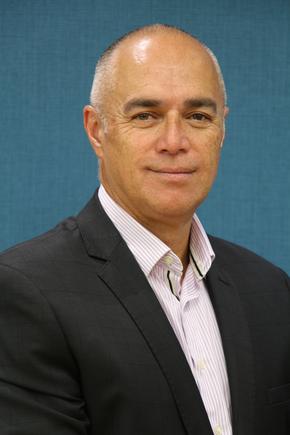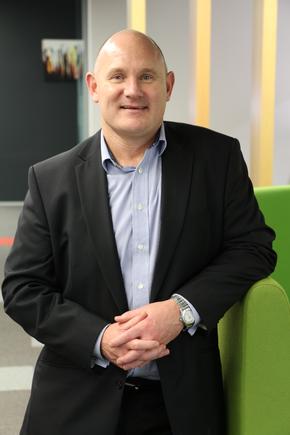A CEO’s perspective on investing for digital capability, innovation and change management
- 05 February, 2018 07:00

Myles Ward smiles when asked whether he has provided a template for CIOs and CTOs making the leap to chief executive.
Ward was Chief Technology Officer at the Inland Revenue Department when he took on the top role at healthAlliance, New Zealand’s largest shared services provider to the health sector, two years ago.
He says he knew what to expect from the transition and having a supportive Chair (David Clarke) assisted this process greatly.
“The role of the CEO is diverse and the relationship with the Chair, the Board, stakeholders, and customers is paramount to ensure that confidence is retained in the company’s ability to deliver to the expectations set,” he says.
“There are many moving parts and a great executive team is key for success, as is the need to ensure that the right culture is set that supports your people and partners to be the best they can.”
healthAlliance is a shared services company that provides non-clinical services to the northern region district health boards (DHBs). This includes planning and supporting information technology and services, staff services (payroll and HR administration), project and programme services, internal audit, financial services (accounts payable, accounts receivable, patient eligibility), and customer service centres.
The support of the board, led by Clarke, and the CEOs of the northern region DHBs (healthAlliance is jointly owned by Northland DHB, Waitemata DHB, Auckland DHB, and Counties Manukau Health) is a major factor in meeting these goals, he adds.
He says having top level support from their customers and the Board is critical as healthAlliance supports the DHBs’ move towards an increasingly digital environment.
He says this support also came through from improving the results of the company and demonstrating value over the past two years, along with taking healthAlliance staff on a journey.
In moving from CTO to CEO, a number of skills had to be surfaced more prominently, while others had to be balanced out, he explains.
“Being a CEO is about leadership, building confidence, and taking your Board, shareholders, customers, and staff along a consistent and achievable journey and ensuring you push the boundaries of what can be achieved.
“Given a large proportion of what the company delivers to its DHB customers is centred around IT related services, the CTO skills were of benefit and initially assisted in sizing up the problems that the region initially had to deal with in its digital journey.”
In leading healthAlliance, Ward says his background in major transformation programmes, specifically at IRD and in banking, has very much helped him.
“Practical experience assists to navigate these complex journeys, as is knowing the building blocks you need to put in pace to implement sustainable digital outcomes,” he says.
“Like any industry, positioning the role of data and the use of that are paramount in understanding your customers and tailoring customer centric outcomes.”
The CEO role as you would expect though goes far beyond that and it’s important CIOs recognise this as they progress their careers into those executive roles, he says.
“It is important that for any CIO entering into the CEO role that they represent the CEO traits and abilities to lead a company in a direction it needs to head and ensure that they take their customers and stakeholders along that journey.”

Being a CEO is about leadership, building confidence, and taking your Board, shareholders, customers, and staff along a consistent and achievable journey and ensuring you push the boundaries of what can be achieved
Across the region and beyond
Ward goes on to say that “health has its uniqueness and patient safety is paramount, and that forms an underpinning context in anything we do at healthAlliance.”
He continues: “IT enables the region’s DHBs to deliver great healthcare outcomes. For the northern region, this is captured in the Long Term Investment Plan and underpinned by the Information Systems Strategic Plan and supporting its road maps.
“These documents define the future of healthcare within the region and how technology plays a role in that in particular the importance of data. They also support the region’s approach to harmonise and regionalise services and leveraging shared services where it makes sense to.”
Ward shares insights on the tech challenges health sector CEOs are facing, as well as the common issues chief executives from other industries face.
“As we start to look at the direction of where the DHBs are wanting to take their models of care, we are going to become more and more digital, more online and make better use of data,” says Ward.
“What is apparent is the thought leadership that exists within DHBs that has progressed this journey and thinking to date and the plans to extend this further.”
“And in support of that, it is very important that we work with the region’s DHBs to enable that with technology solutions whilst staying ahead of that cyber curve, just like any industry where accessibility to data is important to deliver customer-related outcomes.”
He says one of the top priorities of the healthAlliance Board is cyber.
As part of their cyber programme, a Chief Information Security Officer was assigned for the region (Richard Harrison), supported by all four DHB CIOs.
“A good relationship also exists with central Government to ensure that policy, strategies and standards remain consistently applied.”
“To represent the clinical contexts, the recent appointment of Dr Karl Cole as chief clinical information officer) has also paid dividends as has the support from Matt Hector-Taylor who has been instrumental in the development of the regions Information Systems Strategic Road Map. His role plays a critical interface with DHB clinicians that ultimately assists with our delivery and annual planning.”
“That is a really big change for us,” he adds. “It assists with our customer centricity strategy and ensures our services are ‘hand in glove’ with the DHBs so we get clinically-led, technology-enabled outcomes.”
In terms of positioning healthAlliance, working with third parties is crucial to achieving goals, says Ward.
“No company should be trying to do everything themselves. Accessing our technology partners’ intellectual property is key for the region and in positioning the company. ‘NZ Inc.’ plays an important role, as does accessing industry knowledge on technology thought leadership to help become more creative, more efficient, and more agile.
“The move to commodity computing, cloud-based solutions and APIs all play a key role in laying the foundations for the DHBs to achieve their long-term digital goals.
“These new ways of working mean that IT leadership need more financial and commercial skills,” he explains. “There is less tech doing, [and] more enablement for the customer to readily use technology-related solutions.”
“We’ll continue to evolve ourselves, utilise technology partners more effectively, and refine our practices and disciplines in the areas we need to be good at, like any forward-thinking company would do.”
Ward over the time in healthAlliance has also appointed a new executive team introducing executive experiences from other industries such as, from telecommunications, banking, and health.

Apart from Dr Cole, who runs a private practice as well, the executive team includes: Wayne Pohe heading up the tech transformation work, James Allison heading up the large and complex regional IT landscape and related IS services, Denise Dole heading up HR and payroll, Fiona Harnett CFO, Reid McRobie heading up delivery of projects and programmes, and Kevin Robinson heading up engagements with the regional CIOs and the Central Government relationships).

CIO NZ video interview: Myles Ward talks about the move from CTO to CEO
Growing as a leader
Ward is emphatic on not overlooking another investment in this area of rapid change.
“As you grow as a leader you realise it is important to evolve your leadership skills and remain current,” he says.
“Take the time out to invest in yourself as a leader and that will support the company to grow,” he stresses.
“You have to keep evolving your skills on a regular basis, refreshing your skills because the pace of change catches up very quickly and if you are not staying current you are not doing the organisation the justice that it deserves.”
Recently, he attended a three-day executive course at the University of Auckland that is run under Dr Lester Levy’s New Zealand Leadership Institute. He says discussions with participants from the different industries were very invaluable.
“You look at different scenarios and different paradigms,” he says. “It gives you the time to reflect and just think through your tools and techniques to being an effective chief executive.”
Ward says he has built a network of executive peers through the years, way back when he was in banking based in Wellington. He meets with them as well as some peer chief executives for discussions on some of the challenges and programmes they are working on.
Ward is likewise generous with sharing insights for ICT executives on preparing for the top role.
He was recently asked to talk about leading transformation to a group of CIOs, and was pleased to be able to relate to the issues they face. He shared insights from a CEO perspective on leading transformation programmes.
“If I can help change their messaging or evolve their skills, that is a great outcome.”
He strongly encourages CIOs, CTOs and other business technology leaders to “look at your tool belt of skills and really push your experiences into things beyond IT.”
“Practise the language in a way that people can understand.”
“It’s really important that CIOs enter into different domains and extend their skills beyond IT.
"Opportunities such as being a business sponsor can create different contexts.”
Health is an industry that grounds you pretty quickly, he says.
“There is a considerable amount of thought leadership and information sharing that goes on within the region and the dedication to get great health outcomes is unquestionable," says Ward.
“It’s great to be supporting the region’s DHBs’ delivery of healthcare through the use of technology and it’s a privilege to lead this region’s shared service company.”
Related reading on leading through the digital economy:
This tech CEO does not want a 'new elite' to monopolise the benefits of AI
The critical skill that will take CIOs to the top table

'Like any industry, positioning the role of data and the use of that are paramount in understanding your customers and tailoring customer-centric outcomes'
Learn from your peers: Check out our State of the CIO report on the challenges and concerns of CIOs today. Sign up for CIO newsletters for regular updates on CIO news, career tips, views and events. Follow CIO New Zealand on Twitter:@cio_nz Join us on Facebook.
Send news tips and comments to divina_paredes@idg.co.nz
Follow Divina Paredes on Twitter: @divinap

